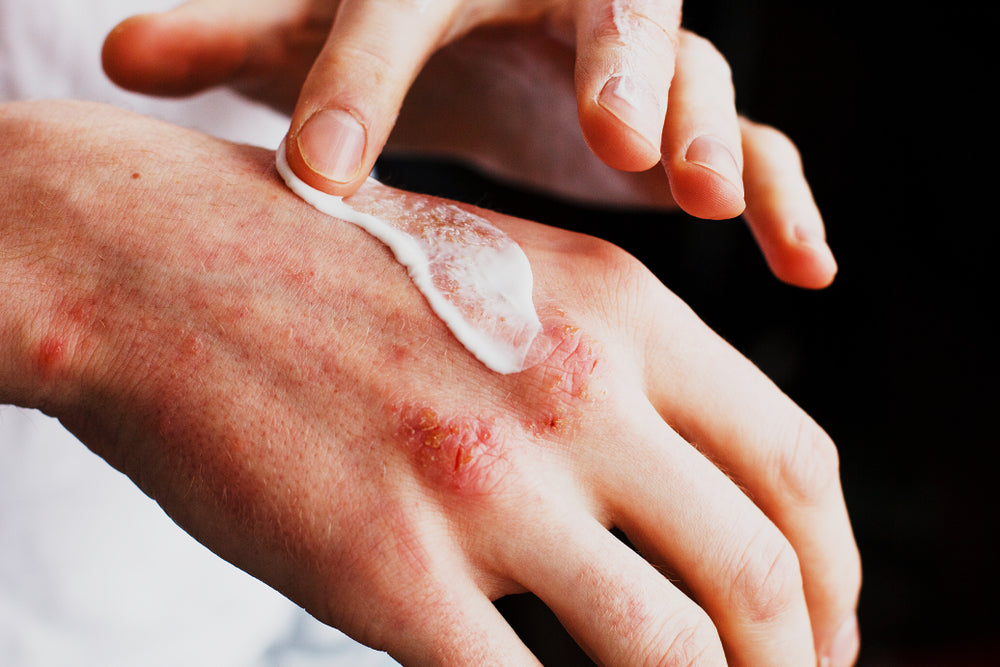Exploring the Psychological Impacts of Eczema
 Eczema, with symptoms such as itching, and sleepless nights, can exact a heavy toll on one's emotional well-being. Eczema tends to flare up due to anxiety and stress, and can further fuel these emotions.
Eczema, with symptoms such as itching, and sleepless nights, can exact a heavy toll on one's emotional well-being. Eczema tends to flare up due to anxiety and stress, and can further fuel these emotions.
In this article, we delve into the psychological impact of eczema and share strategies for coping, while also introducing you to CLn BodyWash, a solution proven to help mitigate the symptoms associated with eczema.
The Stress-Eczema Connection
To effectively cope with eczema, it's crucial to understand the connection between stress and the condition. Stress triggers the body's fight-or-flight response, releasing stress hormones: cortisol and adrenaline. However, when stress becomes chronic, the body may produce excessive cortisol, which can weaken the immune system and trigger skin inflammation. Individuals with eczema are particularly susceptible to this inflammatory response, underscoring the importance of stress management.
The Emotional Toll of Eczema
Eczema, also known as atopic dermatitis, is a chronic skin condition characterized by inflamed, itchy, and often painful patches of skin. While the physical discomfort of eczema is undeniable, its emotional impact is equally significant. Here's a closer look at how eczema affects mental health:
1. Anxiety and Stress Triggers
Living with eczema means enduring not only physical discomfort but also emotional distress. The incessant itch and the resulting sleep deprivation can further trigger negative emotions. Sadly, this turmoil often exacerbates the eczema symptoms meaning that managing this cycle is essential for both physical and mental well-being.
2. Negative Body Image
Eczema can lead to visible skin changes, affecting one's self-esteem and body image. Feelings of self-consciousness and insecurity can contribute to emotional distress.
Coping Strategies for Eczema-Related Stress
Coping with eczema-related stress is essential not only for emotional well-being but also for managing the condition effectively. Here are some tips and strategies to help you navigate the challenges:
1. Skin Care Routine
- Establish a consistent skincare routine that includes gentle cleansing and moisturizing. Avoid harsh soaps and opt for products designed for reactive or compromised skin.
- Consider using specialized products like CLn BodyWash, which is formulated to help manage eczema-prone skin. This body wash is a gentle, non-drying formula and with consistent use, you can see remarkable improvements, including smoother, clearer, and healthier skin. CLn BodyWash is supported by robust clinical evidence, demonstrating its efficacy in reducing eczema-related symptoms, when used for two minutes a day during showers and baths.
- Please consult with your dermatologist for more personalized recommendations based on your unique skin needs.
2. Stress Management Techniques
- Practice relaxation techniques like deep breathing, meditation, or mindfulness. These can help reduce stress.
- Engage in regular physical activity, with guidance from your healthcare provider. Exercise releases endorphins, which can improve your mood and may help alleviate stress.
- Explore creative outlets such as art, music, or writing to express your emotions and divert your focus from eczema-related stress.
3. Seek Support
- Share your experiences with trusted friends and family. Talking about your feelings can provide emotional relief. However, these conversations should be constructive as simply venting has been shown to not help emotionally long term.
- Consider joining a support group for individuals with eczema. Connecting with others who understand your challenges can be comforting and empowering.
4. Consult Professionals
- If eczema-related stress is overwhelming, don't hesitate to seek help from mental health professionals. Therapy or counseling can provide valuable tools to manage the psychological effects associated with eczema.
- Consult with a dermatologist for personalized treatment options. They can help you find effective ways to manage your eczema symptoms.
5. Prioritize Sleep
- Create a sleep-conducive environment by keeping your bedroom dark, cool, and comfortable. Consider using blackout curtains and white noise machines if needed.
- Develop a bedtime routine that promotes relaxation. This can include activities like reading, taking a warm bath, or practicing relaxation exercises.
6. Healthy Lifestyle Choices
- Maintain a balanced diet rich in fruits, vegetables, and whole grains. Proper nutrition can support skin health and overall well-being.
- Limit or avoid alcohol and caffeine, as they can disrupt sleep and exacerbate stress.
- Stay hydrated by drinking an adequate amount of water throughout the day. A water bottle with markers can help you remember to drink the proper amount of water during the day.
7. Educate Yourself
- Understanding your condition can empower you to manage it more effectively. Learn about eczema triggers, treatment options, and self-care practices.
- Stay informed about the latest research and developments in eczema management. This knowledge can help you make informed decisions about your care.
Eczema Doesn't Have to Claim Your Life
The cost of eczema is more than skin deep; it can have a profound impact on your mental health and overall quality of life. The psychological toll of eczema, from stress and anxiety to sleep disturbances and self-esteem issues, is undeniable. However, by implementing coping strategies and seeking support, you can significantly improve your mental well-being while effectively managing your eczema.
Remember that managing eczema is a journey, and it's essential to be patient with yourself. As you navigate the road ahead, consider incorporating specialized skincare products like CLn BodyWash into your routine to help manage your symptoms effectively. Consulting with healthcare providers and dermatologists to determine the best approach for your unique needs helps this even further.
With the right strategies and support, you can reclaim your mental well-being and live a fulfilling life despite eczema's challenges.
